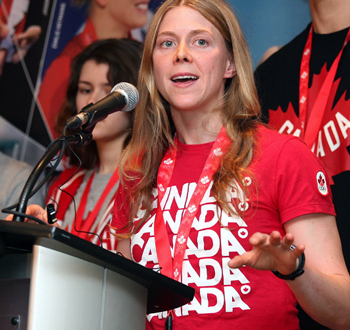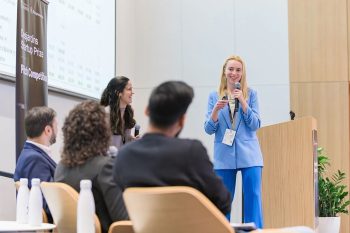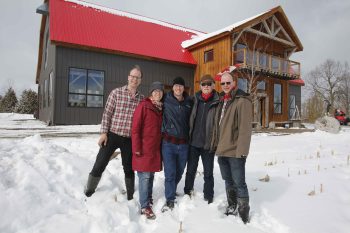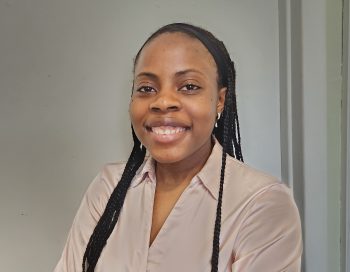It’s an understatement to say that incoming Civil Engineering PhD student Donna Vakalis has a busy few weeks ahead of her before she joins the Faculty of Applied Science & Engineering. Just days before starting the program, the Toronto native who received her Master’s degree from U of T’s John H. Daniels Faculty of Architecture in 2009, will be competing in the pentathlon at the London Olympic Games.
As one of just 36 people from around the world who qualified for the event, Vakalis will be shooting, riding, fencing, running and swimming her way towards the gold medal. She recently took some time out of her hectic training schedule to answer a few questions for U of T Engineering about her Olympic and professional goals.
How did you start your career as a pentathlete?
I started out as a competitive swimmer and horseback rider, then learned about pentathlon from a fellow member of the Pony Club. At age 15 I retired from pentathlon and all sports. I made my way back to sports when I was doing my Master of Architecture at the University of Toronto. At the time, I found I was missing fencing and running and swimming. I felt the urge go workout to escape the studio. It built momentum to the point where I think I was probably training more hours than I was sleeping, which is only about five hours a night for the typical architecture student!
I’ve come a long way since then. I’ve been trying out different arrangements with working and schooling and training to find the right balance. I’ve also been working for a flexible employer, Janet Rosenberg and Associates, which has allowed me to make money to pay for training.
Where were you when you found out you would be competing in the pentathlon at the London Games? How did you feel when you got the news?
I was in China and felt a strong mix of emotions — including being tired from competing that day. But I felt overwhelmingly joyful.
Since then, what have your preparations and Olympics training been like?
There isn’t one typical day because we rotate between three and five training sessions per day between five disciplines. We also have supportive activities like weights and physiotherapy. I can say that there is often one morning workout like swimming, followed by a break. During the break I would normally go to work, but leading up to the Olympics I’m taking the time to concentrate purely on training. Now my breaks are more likely to be used for weights or a nap! After the break we have another training session such as running or shooting. Another break follows, then we have an evening session like fencing for few hours. Mix and repeat.
What are you looking forward to the most about competing in the London Games?
The experience leading up to the Olympics has already been incredible, and it’s only going to ramp up. It’s hard to guess what will top how great it is being part of the Olympic team. One momentous occasion will be wearing my Canadian uniform and meeting my friends and family just after crossing the finish line on competition day (August 12th, 2012) – potentially in medal form!
A few weeks after competing at the Olympics, you will be joining U of T Engineering’s PhD program in Civil Engineering. How did you feel when you found out you were accepted into the program?
I got the two pieces of news within days of each other: the official acceptance into U of T Engineering and the official news of being on the Olympic team. My excitement for each was multiplied exponentially. For that reason, I think the two experiences will always be intertwined in my mind. I know it’s kind of nerdy, but I get really giddy thinking about beginning my PhD. After finishing my Master’s in 2009, I knew that I’d want to return to school so I’ve been looking forward to this for a few years now.
What would you say are the skills that you’ve developed as an athlete that would be most helpful to you as a PhD candidate at U of T Engineering?
Since I’ve visited so many cities in the last four years, I’ve observed the different ideas expressed in buildings and infrastructure from all over the world. If you pay attention during travel, it can provide you with a wealth of innovative ways to design the extra small-, medium- and large-scale details of a city. I think I’ve also gotten the knack of fitting in 20-plus hours of output into 16 waking hours!
What will be the focus of your PhD work? Why did you choose that area of Engineering and what impact do you hope your research will make?
My focus will be on sustainability metrics for large-scale built projects with Professor Heather MacLean. I understand “sustainability” to capture the health, ecological and economic consequences of our activities and I hope that I can first educate myself. I want to use what I learn as a platform to help direct the radical changes we need to make to improve the world we live in. If we understand the consequences of the decisions we make in engineering and architecture activities, we’ll be better poised to make smarter decisions and imagine alternatives that haven’t been tried yet.
How do you plan to spend your time after the 2012 Games and before your start at U of T Engineering?
After competing in London, I’ll spend one week cycling around the Netherlands with my boyfriend. Then I’ll return to Canada and fly immediately to Vancouver for the 2012 Canadian National Championships. Classes will begin one week after that. Between moving into a new place and setting up timetables, I can only hope to spend a few days with friends to savour the prelude to the next big adventure that will be my PhD.
For more information about Donna Vakalis and to make a contribution to her training fund, visit her website thisisdonna.com, or follow her on Twitter at twitter.com/SportIsAllOver. You can also read our earlier article on her here.



